#Kamiki Ryunosuke's Filming Break
Explore tagged Tumblr posts
Text
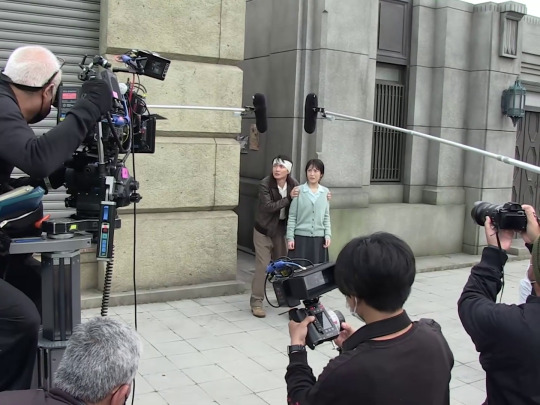
Ryunosuke Kamiki and Minami Hamabe prepare to break everyone's hearts during filming of Godzilla Minus One.
#ryunosuke kamiki#minami hamabe#godzilla minus one#behind the scenes#i'm finally looking at all the videos they released prepare for pain
436 notes
·
View notes
Text
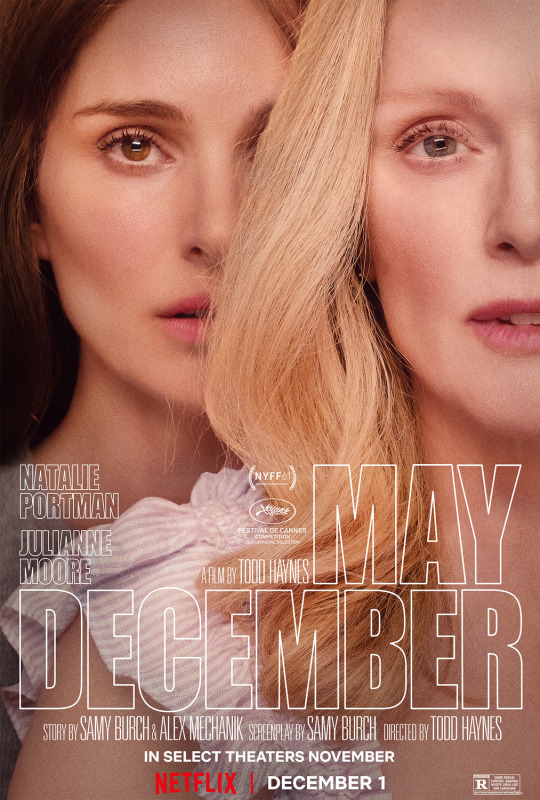

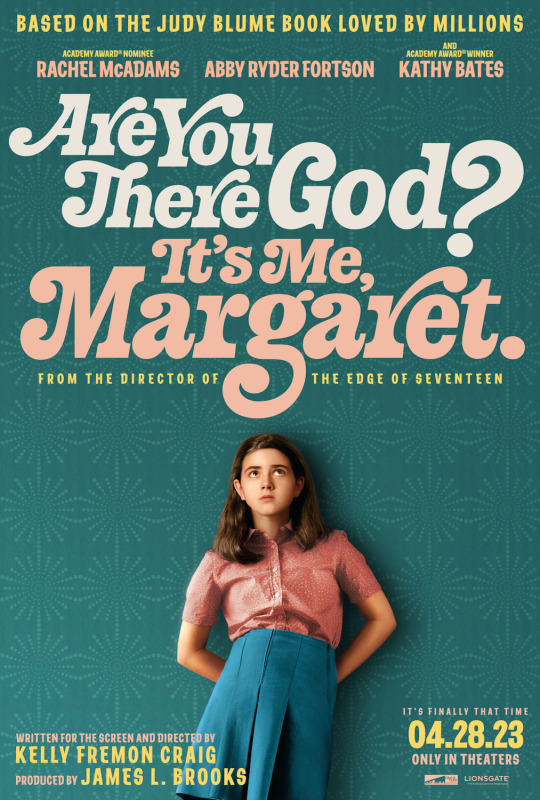



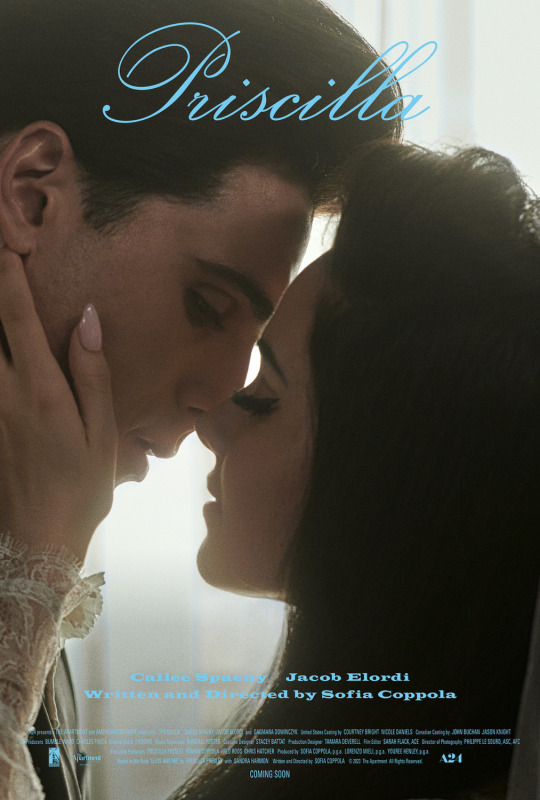

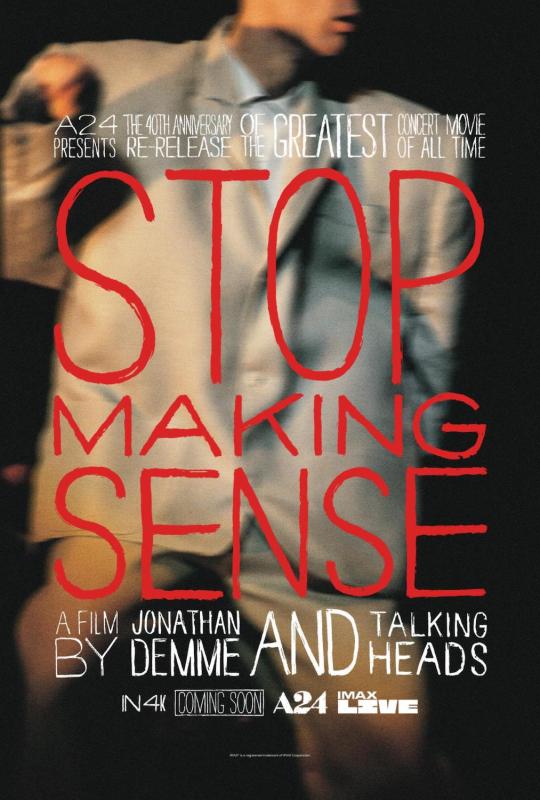

2023
Anatomy of a Fall (Justine Triet)
Are You There God? It’s Me, Margaret. (Kelly Fremon Craig)
Beau Is Afraid (Ari Aster)
The Curse, "Land of Enchantment" [S01.E01] (Nathan Fielder)
Gush (Fox Maxy) @ New Directors/New Films 2023
How to Blow Up a Pipeline (Daniel Goldhaber)
I Thought the World of You (Kurt Walker) @ Persistent Visions Program 1: Always and Only Place, MoMI
Killers of the Flower Moon (Martin Scorsese) [+ its teaser trailer]
Knock at the Cabin (M. Night Shyamalan)
May December (Todd Haynes) @ Opening Night, NYFF61
Mission: Impossible – Dead Reckoning Part One (Christopher McQuarrie) in IMAX
My Own Private Final Destination (Alexandra McVicker & Zach Donovan) @ KGB Red Room (09/13/2023)
Oppenhemier (Christopher Nolan) in IMAX 70MM
Our Home Out West (Drew Tobia)
The Outwaters (Robbie Banfitch) [+ Card Zero & File VL-624 (Robbie Banfitch)]
Passages (Ira Sachs)
Priscilla (Sofia Coppola)
Renaissance World Tour (Beyoncé) @ SoFi Stadium, Inglewood, CA (09/01/2023)
Saint Omer (Alice Diop)
Stop Making Sense - IMAX (Jonathan Demme)
Succession, “With Open Eyes” (Mark Mylod & Jesse Armstrong)
Sunset Boulevard (Jamie Lloyd), West End Production (10/17/2023)
The Swan (Wes Anderson) [+ Asteroid City (Wes Anderson)]
Vanderpump Rules, “#Scandoval” [S10.E15]
The Zone of Interest (Jonathan Glazer)
+++
Birth/Rebirth (Laura Moss)
Creed III (Michael B. Jordan)
The Boy and the Heron (Hayao Miyazaki)
the crash sequences in Ferrari (Michael Mann)
The Holdovers (Alexander Payne)
John Wick: Chapter 4 (Chad Stahelski)
The Killer (David Fincher)
Master Gardener (Paul Schrader)
Monster (Hirokazu Kore-eda)
PARADISE LOST (Richard Hines) @ Daniel Cooney Fine Art
Poor Things (Yorgos Lanthimos)
Reality (Tina Satter)
Rotting in the Sun (Sebastián Silva)
Smoking Causes Coughing (Quentin Dupieux)
SPRING/BREAK Art Show 2023
Suzume (Makoto Shinkai)
Teen Art Salon - A Protospective @ MoMA PS1
Thanksgiving (Eli Roth)
To Catch a Killer (Damián Szifron)
“Very Delta #65 "Are You A Forever Eye-Con Like Me?” (w/ Raja)”
the 3D sequences in A Woman Escapes (Blake Williams, Sofia Bohdanowicz, & Burak Çevik)
-----------------------
Performances, 2023:
Dave Bautista - Knock at the Cabin
Robert De Niro - Killers of the Flower Moon
Cole Escola - Our Home Out West
Mia Goth - Infinity Pool
Elle Graham - Are You There God? It’s Me, Margaret.
Sandra Huller - Anatomy of a Fall & The Zone of Interest
Soya Kurokawa - Monster
Guslagie Malanda - Saint Omer
Rachel McAdams - Are You There God? It’s Me, Margaret.
Julianne Moore - May December
Natalie Portman - May December
Addison Rae - Thanksgiving
Judy Reyes - Birth/Rebirth
Margot Robbie - Barbie
Franz Rogowski - Passages
Mark Ruffalo - Poor Things
Kamiki Ryunosuke - Godzilla Minus One
Dominic Sessa - The Holdovers
Nicole Scherzinger - Sunset Boulevard
Cailee Spaeny - Priscilla
Emma Stone - The Curse
Alyssa Sutherland - Evil Dead Rise
Sigourney Weaver - Master Gardner
Sophie Wilde – Talk to Me
Teo Yoo - Past Lives
#best of 2023#lists#personal#best of#renaissance#anatomy of a fall#Are You There God? It’s Me Margaret.#knock at the cabin#may december#my own private final destination#the outwaters#priscilla#stop making sense#sunset boulevard
25 notes
·
View notes
Text
Godzilla Minus One Non-Spoiler Review

Holy shit, I loved it. Perfection, it lived up to the hype. I genuinely think this is just gonna be one of those theater experiences I remember the rest of my life it felt life changing. Takashi Yamazaki cooked a gourmet 5-star meal here. As far as solo, "Godzilla vs. The People of Japan" type of Godzilla movies go, this rivals the original 1954 film in terms of quality, which is crazy to say since I adore that movie. The human drama was excellent, and I felt so much dread and worry for the human characters, Ryunosuke Kamiki was amazing as Kōichi Shikishima.

I felt my heart breaking for him at multpile points in the film. He's definitely a tortured soul hunted by the past and his regrets, and I was desperately rooting for him to survive throughout the movie. Same goes for all the other characters, to be honest. There's not one character in this film I didn't dislike or felt bored by, I'm not sure I could pick one supporting character I like more than another. They're all likable characters that you want to see survive and overcome Godzilla.

And speaking of the big man himself, Godzilla in this movie is, well, he's genuinely scary. Not in a gross mutilated way like Shin Godzilla, but in a more angry, pissed off, visceral way, he felt genuinely ragefull and unhinged full of destructive hatred. I loved him. MinusGoji cemented himself in my top 5 Godzillas.

This is genuinely the first time I've been genuinely afraid of Godzilla. Sure, it probably helped that I saw it in an Imax theater, and it sounded like he was about to bust through the screen. Still, I'm sure if I saw it again in a crappy little theater or my TV, I'd still feel the same, this Godzilla is scary, and I love it.
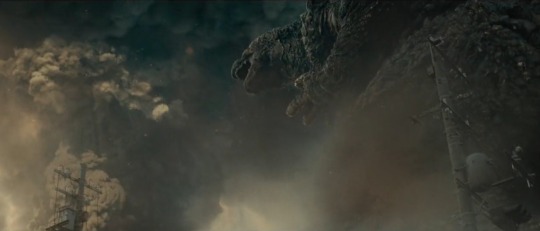
Anyways, 10/10 movie. Maybe I'm still riding the high of this experience, but idc this felt like a life changing type of movie for me, and it's a 10/10.
#godzilla minus one#toho kaiju#kaiju#godzilla minus 1#toho#godzilla#gojira#godzilla movies#takashi yamazaki#ryunosuke kamiki
15 notes
·
View notes
Text

Whew, wow, I was going to dismiss this movie away... until the last few minutes changed my mind. A great example of how an ending makes or breaks a story. Not a Must Watch. But still a watch for the curious.
Godzilla Minus One is a 2023 Japanese epic kaiju film directed, written, and with visual effects by Takashi Yamazaki. Produced by Toho Studios and Robot Communications and distributed by Toho, starring Ryunosuke Kamiki, Minami Hamabe, Yuki Yamada, Munetaka Aoki, Hidetaka Yoshioka, Sakura Ando and Kuranosuke Sasaki.
#godzilla minus one#godzilla#koichi shikishima#epic#kaiju#japanese#monster movies#campy#cathartic#toho#ryunosuke kamiki#minami hamabe#yuki yamada#munetaka aoki#hidetaka yoshioka#sakura ando#kuranosuke sasaki#japanese film#movie review#2023
17 notes
·
View notes
Text
Godzilla Minus One Review: Conflicting emotions for a solid entry.
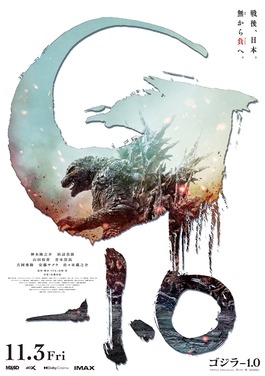
Oh boy, I can't wait to see the reaction this one gets.
This is one I was originally going to wait on reviewing when it hit Home video so I could have a fresher experience and do a more thorough covering of all that I wanted, not to mention screen grabs. I usually give much shorter reviews on theatrical release, but this one it didn't feel right to do that with. I did however see it more recently, so I figured it was finally time to gather my thoughts and finish this up.
If you want my non-spoiler thoughts, I think Minus One was a great time and one of the better Godzilla films. It is remarkably well made, with a solid structure that puts much higher budget films to shame with what it accomplishes. However I also don't believe the film takes advantage of its setting to properly explore some of complex themes and elements, nor do I believe it to be as deep as many critics have lauded. There are great emotional segments that work to ground the grandiose dread incurred by Godzilla. But I found the social commentary aspects rudimentary and entry level, even afraid to get truly mean, which I can only chalk up to nostalgic admiration for the era.
Now, if you wanna get more into my thoughts, hit the jump.
We follow Kōichi Shikishima (Ryunosuke Kamiki), a failed Kamikaze pilot who, near the end of the war, deferred to Odo Island rather than carry out his duty. There, his mortal fear results in the death of multiple other men when he is unable to take a shot at a (pre-mutated) creature the natives call Godzilla, with the only other survivor, technician Sōsaku Tachibana (Munetaka Aoki) blaming him for their needless deaths.
Riddled with survivors guilt and PTSD, Shikishima's life doesn't get any easier upon returning the burned out Tokyo, where he finds his home and family were destroyed in the fire bombing. A series of circumstances soon brings him together with Noriko Ōishi (Minami Hamabe) and the baby she rescued during the bombings, Akiko (Sae Nagatani, as a toddler), the two are taken in by Shikishima, although more so on Ōishi's choice than Shikishima's. Over the course of a couple of years, Shikishima manages to build something out of the rubble for himself, gaining employment with the Government as a Mine Sweeper aboard the Shinsei Maru. Here we're introduced to the rest of our supporting cast: Kenji "Doc" Noda (Hidetaka Yoshioka) a former Naval weapons developer; Capt. Yōji Akitsu (Kuranosuke Sasaki); and Shirō "Kid" Mizushima (Yuki Yamada) the only member not to see military service.
But soon the consequence of the US' Operations Crossroads test become apparent when the USS Redfish is sunk after pursuing an unidentified creature. Due to various geopolitical reasons, the US refuses to get anymore involved. Douglas MacArthur releases several Battleships back to the Japanese Government, who themselves remain coy to the public about the reality of the situation. The Minesweeper crew are sent near the Ogasawara to stall until the heavy Cruiser Tako makes its voyage back from Singapore. It's here where Shikishima realizes what the monster is.
Obviously, a glorified tugboat is less than ideal to go up against Godzilla, but one of two mines acquired for the mission manages to lodge into Godzilla's mouth, which upon exploding takes a chunk of its skull out, temporarily killing Godzilla before immediately regenerating. The crew are saved by the arrival of the Tako, which manages to knock Godzilla down, but it has less success than the mine; ultimately succumbing to Godzilla's Atomic Ray, but allowing the Maru to escape.
Days later, Godzilla breaks through Tokyo bay and into Ginza, laying waste to the district and attacking a train Ōishi is upon, who barely escapes. Shikishima rushes to the area and reunites with Ōishi, just as tanks engage with Godzilla, causing a retaliation with Atomic breath. Ōishi pushes Shikishima in an alley as she and other bystanders are swept up in the atomic winds, leaving Shikishima once again a lone survivor, as black rain pours down.
After Ōishi's funeral, Noda informs Shikishima of a civilian led plan to kill Godzilla, mostly formed with former naval veterans.
The plan is one of the more ingenious of the series. Two naval vessels will carry a line of Freon gas containers to entrap Godzilla over the Sagami Trough. The Freon will lower buoyancy and sink Godzilla 1,500m+ deep, presumably crushing it under the pressure. As a plan B, inflation devices will be deployed to induce rapid decompression.
Shikishima proposes getting a hold of a fighter plane to help lure Godzilla, although his actual intentions are making use of a kamikaze attack right into the mouth as a plan C. However all planes were decommissioned after the war. The one exception Noda finds being a prototype Kyushu J7W Shinden in massive disrepair. Thus, Shikishima begins the arduous task of specifically tracking down Tachibana, getting a black-eye for his trouble. Still, Tachibana arrives nonetheless and gets to work on the aircraft, while Shikishima prepares to leave Akiko in the care of his neighbor.
Things do not go according to Plan. While Godzilla sinks, it has no adverse effect. Plan B in enacted, but at 800 meters Godzilla stops ascending, having torn through the inflation devices. The ships aren't strong enough to pull Godzilla manually, but thankfully help arrives in the form of Mizushima and a fleet of tug boats. Together they manage to force Godzilla to the surface, badly damaged, but not enough. The Kaiju begins charging an atomic assault when Shikishima speeds in, flying directly into the mouth, exploding the head. The Atomic charge, with no where to go, tears through Godzilla's body, destroying it.
In the air, Shikishima descends from a parachute, thanks to Tachibana installing an ejection seat and encouraging him to let go and live.
Upon returning to land, Shikishima learns of Ōishi's survival and reunites with her badly bandaged, but alive and surprisingly intact self. Tearfully hugging, as a mysterious black mark spreads across her neck.
Deep in the ocean, Godzilla's remains sink further down, and begin regenerating.
We will be talking about the story elements here in a bit, but first I wanna front-load this with more praise before tackling that beast.
First off, a lot of attention has been given towards the CG, something which at the time of this writing has garnered an Oscar. A common clickbait buzz article around the film is "Better than Hollywood." In spite if that gaudy terminology, it's not something I disagree with. Some of the vehicle models are rougher and honestly not much different than what was seen in Shin. But Godzilla and the water are incredible. In fact, Yamazaki was so enamored with the fidelity that he rewrote the climax to be in the ocean, a choice I fully agree with. Although I am curious what the original entailed.
But while the CG quality is quite literally Oscar worthy, I think it's worth examining that it's not just a matter of graphics, but presentation. Takashi Yamazaki is above all else a talented director who knows how to make a scene exciting, capable of envisioning the finished product and what is needed every step of the way. This is by far the greatest strength of the film. Almost every scene is approached asking how to best showcase it, which is accomplished in flying colors. Suffice to say, every instance with Godzilla is harrowing and breathtaking, having quite possibly the scariest moments in the franchises 70+ year history. The attack on Ginza is largely filled with recreations from '54, but they are incredibly well done, and the original bits are worthy of the upmost praise; I cannot stress how truly great the boat chase is. Not only is it one of the best moments of the film, but it's also a demonstration of Yamazaki incorporating influences in a more original and less derivative manner compared to some previous efforts.
That said, for long time fans there are a plethora of visual nods to past material. From Gojirasaurus, to the Atomic build up in '14, a foggy blue atomic haze like in '54 and '62, Godzilla's eventual demise is reminiscent of GMK, even the model lacks muscle simulation to make it stiffer and more suit like. There are also numerous other details, my favorite of which is that Godzilla's Atomic ray causes self inflicted damage, and you will always see Godzilla's mouth healing afterwards, particularly the left side. Little touches like that go a long way for me.
Likewise, the score is impeccable. Akira Ifukube's legendary Godzilla March returns, arranged by Naoki Satō along with a few tracks from King Kong vs. Godzilla and Mothra vs. Godzilla as a new Suite. The theme is not over used, only appearing twice maybe three times in the film, plus a pre-credits scene, all very appropriate usages. Meanwhile, Naoki Satō's original score is a wonderful mixture of understated-- even atmospheric pieces, and a grandiose haunting apocalyptic orchestra. He utilizes these long drones that invoke naval horns, prop aircraft, and air-raid sirens that blend into each other. What might sound like a siren slowly builds, becoming more prolonged and pitched until it's suddenly an aircraft in a nose dive. Really spectacular stuff.
By far the stand out pieces of the Score are "Divine" and "Promise" (A leitmotif of the former) You likely heard these in the trailers, and with good reason. They are a befitting crescendo to Godzilla's rein of biblical destruction, ones that I have listened to repeatedly.
But while I do have a lot of praise for the audio visual aspects, we also need to delve a bit deeper into the story beyond just the basic plot points. And it's here where I think Minus One is at its most interesting, and also where I'm most critical. The reasons why being more thematic than structural.
In the lead up to Minus One's theatrical release there were rumblings on what exactly sort of picture the film would be thematically. Writer/Director/SFX Supervisor, Takashi Yamazaki, has a semi notorious reputation for doing conservative leaning, and to some, borderline propagandist films. That might come as a surprise if you only know his work on animated features, but he's also had his hand in many period pieces set from the 30s to 50s, mostly adaptive works like Sunset on Third Street, and The Great War of Archimedes. All this lead to speculation that Minus One could be this nationalistic throwback to imperial sentimentality. Was this simply going to be a film in which the shame of a failed kamikaze pilot finds new purpose through overcoming Godzilla to gain a win after the war; was Godzilla going to be a metaphor for not accomplishing a task in war leading a much larger and harder to kill atomic monster i.e. "the enemy" etc. etc.
The answer is more complicated than a straight yes or no. On the surface, Minus one seems like a film that could go down either the nationalist rabbit hole, or an opportunity for the nuanced exploratory personal growth of a broken veteran fighting to build a better future. At face value this isn't a problem, and there are clearly elements which work in favor of the latter. But I think it's fair to say they're never fully examined. Indeed, omission and glossing over if not outright ignoring certain key topics is the most concerning part of the film, rather than anything blatant.
Yamazaki has this… bizarre obsession with nostalgia. It falls into an unhealthy combination of adoring the past simply for being the past, acknowledging that maybe there were bad things, but mainly rose tinting everything while cutting out the really bad stuff.
Quite honestly, I do think the film suffers due to those eccentricities. The film wants to be a story about our protagonist struggling alongside others also disenfranchised by the conflict, with Godzilla being a simple distillation of those challenges and a reminder of our protagonist's failure. Yet the film doesn't begin to scratch the surface of the subject material it's pulling from, nor does it allow the audience to pontificate on them. Minus One wants to be seen in the same sociopolitical light as the original '54, or at least as Shin. Yet it never reckons with the reality of the war and post war beyond very mild criticisms of leadership and Shikishima's own guilt.
I want to highlight two key points of this tangent: Yamazaki's creative talent/weakness, and the film's aforementioned criticism of Japanese leadership. The former is relatively straightforward, Yamazaki is talented. Whatever there is to say about the man, he's competent in the grammar of film, and a particularly brilliant visual story teller. While I am ragging on the film's story and narrative themes-- they're not badly told. It's a solid 3 act structure and presentation is for the most part really good. Shikishima is a compelling character who has an interesting chip on his shoulder with survivors guilt. There's a captivating set up about personal shame and a recognition of how pointless the loss of life was, only to be faced with more hardships after the war. That is a fantastic angle to start off with. Minus One also does something that I felt was lacking in Shin Godzilla, which is not sanitizing the loss of life by avoiding depictions of it. You never saw the human cost in Shin Godzilla, as the movie focused so much on the economic impact without a harsh contrast to the dry satire. But here? Carnage is on full display and used appropriately, contrasted with the more personal story of our protagonist who is just one of thousands suffering.
But this movie isn't in isolation; its scenes are not in isolation. I have to look at it as a whole and all that entails. While the story itself is not badly told, you can see weakness in the writing from the supporting characters. They're not bad, in fact I enjoy the cast, but they're not really people so much as archetypes. The elder, the smart guy, the green horn, the love interest. Characters who exist more to support Shikishima and give him drive, but that's kinda it. Noriko gets it the worst as her main purpose in the narrative to simply be ripped away from the protagonist as a driving force. The saving grace is she isn't fridged, and Minami Hamabe gives one hell of a performance for a character that's predominately "wife type". But goddamn does she make the emotional scenes she gets stand out, particularly Shikishima's breakdown and admission to the Oda Island incident. She also sells the hell out of the train sequence.
Regardless, the above is indicative of a wider issue with the side characters, and that's a refusal to simmer on most sources of conflict without immediate resolution or abandonment for our Protagonist's sake. For example, Shikishima's neighbor, Sumiko Ōta (Sakura Ando), blames him for the death of her children, that people like him was why the war was lost. Not 5 minutes later we get a scene of her taunting Shikishima for helping Noriko and Akiko, and how she's done caring about others; only to immediately give food when she realizes Noriko can't breastfeed the baby. On paper, I like this. That even the bitter and misanthropic can still have heart. But it speed runs through that conflict, and because of the time skips, we just have to accept that they're on great terms two years on, even babysitting Akiko. (As an aside, it also sucks there are only two women with speaking roles and both have their rougher edges rounded off in the first 20 minutes.) It goes beyond simply being hopeful in the face of nihilism and frankly into a degree of ignorance needed to service a plot. With the one exception outside Shikishima maybe being Tachibana, most characters aren't allowed to be complicated people. We just have vague uncaring monoliths like Government.
This brings me to the films criticism of Japan's leadership.
At a glance, it might seem like the film will engage with at least some the country's horrific wartime excursions… and it just doesn't go beyond the leaders sucking. The most we get is Noda going off about how Tanks lacked appropriate armor, the lack of ejection seats in aircraft, poor supply lines, the general disregard of Japanese lives, etc. And that sequence is mainly there just to foreshadow the climax with that mention of the ejection seat. But it's also interesting how this is as far as critiquing the war itself goes.
A common rhetoric among even the most nationalist of Japan's conservatives is that leadership during the war was bad. Not that the goals were wrong, just the fact that they hindered the war effort. It's a clever way to seem like you're being critical of the war without bringing up the rape camps or mass murdering of innocents. You get to celebrate and mourn the service men as martyrs, while condemning the higher ups for failing in strategy and equipment. This is clever, because I don't believe most people would pick up on this element. This isn't "waving an imperial flag and screaming at Korean students at school" sort of messaging. This is actually closer to what a lot of confederate apologist employ as a tactic by portraying more sympathetic scenarios. A not necessarily disagreeable humanization of the soldiers who got a shitty deal, but one that also selectively cuts around the most unsavory elements. They'll highlight the humanity of veterans wholesale, but not condemn let alone mention their role in anyone else's suffering. Lament the firebombing of Tokyo, but ignore the lives ruined by Unit 731, Rape of Nanjing, and Three Alls Policy.
Because the film never pushes super hard on the Government criticism, the above can be read as applicable to Minus One for their absence. I believe a more nuanced film would explore at least some of those aspects, be capable of self reflection while making much harsher critiques of the Japanese Government during and after the war to avoid such comparisons. Not to mention the Allies who, let's face it, cared more about their colonies being fucked over than the atrocities. Hell, the head officers of Unit 731 weren't even prosecuted for war crimes in exchange for their research.
But that isn't the point. We're here to focus on the suffering Japanese, but only in nebulous ways that may mention the food shortages in post war, or Government imposed gag orders, but we never explore them with any sort of befitting gravitas.
The narrative wants you to think-- but not too much. Don't think about the events that lead here, definitely don't think about war crimes, and certainly don't think about those occupying US forces.
To me, that last one is the most egregious of all because it was the most inescapable subject of post war Japan, an occupation that infested every single aspect of daily life for 7 years. They just gloss right over it. It's not even a visual or narrative background element, and the occupying forces never engage with Godzilla because of Cold War tensions with the Soviets.
This isn't to say that the film has to get into every facet of its setting or subject. 2001's GMK featured a Godzilla reincarnated from the souls of WWII victims, enraged that Modern day Japan has forgotten both its crimes and the horrors of the bomb. But that's just a part of what is by in large a monster brawl movie in a contemporary setting.
I then have to ask why GMO is predominantly set just 2 years after the war if they're simply going to ignore swaths of the real history of the era? It's practically negligent, even revisionist. That flagrant disregard towards very real events is done repeatedly throughout. There's a heavy emphasis on the uselessness of the post war Japanese Government, but like the occupation, it's milquetoast at best and largely used as an excuse for a civilian led effort to kill Godzilla.
All this paints a bizarre picture of a post war Tokyo as being a rough shanty town, but also full of resourceful quirky citizens able to build a living if they work hard; blissfully free from an Occupation that will force you into a union, then bust it when there's a dispute because Unions are for commies.
This is a reoccurring issue in Yamashiki's works. He often sugar coats the most damning elements and has a tendency to become overly mawkish towards the main characters and the era they reside, regardless of whatever struggles are present. There will be one or two lines that address some serious shit, but just as quickly moved past. That's fine for a Doraemon story, but it becomes pervasive in a post war PTSD picture. It gives the impression that the absence is intentional, as is often the case with toxic nostalgia. Because if one suddenly views an era as all encompassing, if you have to think of people and events as complex, nuanced, or imperfect, then you might have to confront some really challenging ideas that get in the way of one's philosophy in wanking to the good 'ol days.
Remember the past, but only the parts that matter for convenience.
But, let's be fair about this. Minus One was a very low budget film, barely 12 Million USD, if that, but certainly less than $15 mil. That puts it in the same range as something like M3GAN, which makes me question what the hell was going on with the VFX department. Still, it's worth examining that budget is a legit reason to not tackle the subject of occupation. If you can't afford a bunch of foreigners, why bother in the first place? Besides, Shin Godzilla showed that trying to direct people in a language you might not understand, and who might not understand you, can be painfully awkward. So just figure out a way to write them out, and they did. Hell, according to Yamazaki, Toho wouldn't even let him do pick-up shots, so that's pretty damn restrictive.
The other reason is narrative focus. Those aforementioned subjects arguably wouldn't play much of a role within this story. Would a story that incorporates them be more interesting? Potentially. They could also just as easily be poorly handled or bog down the journey our protagonist goes through. This is squarely Kōichi Shikishima's tale of survivors guilt, to the extent that money, shelter, and food are largely waved away in time skips. Instead, this is how the war never ended for people like him and Tachibana, how the death of those men haunt them. While that could easily lead to a fairly dark and cliched "Do we get to win this time?" narrative, I think the film handles it well enough, particularly in that Shikishima doesn't commit a suicide run. I will admit not everything is perfect even here; the handling of his PTSD ranges from one of the best scenes in the film as a nightmare, to clunky, even bordering on outright comical in one instance. Still, the film mainly hits most of the major marks for his journey in a well told fashion. We have really great initial set up showcasing his personality and the start of this troubles; he finds purposes in post war Japan; builds a modest living; 40 minutes in we establish a weakness for Godzilla; Shikishima slowly begins to accept that he should be happy despite the ghosts still haunting his dreams; right at the one hour mark he has that optimism crushed by Godzilla in a gut wrenching sequence in Ginza; he's brought to his lowest point; sets out upon revenge no matter the cost; gets told to live his life by Tachibana himself; defeats the physical manifestation of his demons; is rewarded with a family and is able to finally leave the war behind.
As is, Minus One is a tight little package of a story that breezes past its 2 hour run time and never drags nor feels overly rushed. Whatever grievances I have with the supporting characters and setting, the broad strokes work very well. And I think you could make an argument that having a strong focus on a central character and their one major struggle is far better than trying to balance three characters who don't have defining characteristics. Minus One knows what it wants out of the protagonist and it hits the mark perfectly, even I don't think it's quite as deep a others have made it out to be. But it bears mentioning that it's still a success. I have and will remember Shikishima and his story far more than, well, most Kaiju film protagonists.
This then leaves us with the ending, which culminates in this "unite and overcome hardships" angle, ostensibly doing what Shin Godzilla did. But whereas Shin critiqued red tape and bureaucratic apathy from its leaders and an overbearing U.S., all while showing a willingness to work with other nations as equals; Minus One sort of implies that the Japanese population can defeat any monster if they are truly united. Which can be concerning given everything else we've discussed up to this point about dog whistles. In any other circumstance I would give a great benefit of the doubt to this narrative morsel. This could easily be a story of citizens coming together to solve problems the useless ass Government refuses to and it be as simple as that.
But knowing Takashi Yamazaki's previous work includes Eternal Zero, based on the book by war crime denier Hyakuta Naoki, and adapted without a hint of Verhoven-esque satire, well, it's hard not to scrutinize the intent in any of Yamazaki's films.
That's the crux of all this. Because a lot of elements in Minus One could be interpreted as the complete opposite of a nationalist message, and the vast majority of people have viewed it as such. I also can see this as Shikishima and others as symbolically defeating the manifestation of the atomic monster, overcoming the lingering horror that destroyed their nation in the hopes of making a better tomorrow. That despite an apathetic Government and nuking, the people can unite and rebuild from the ashes, no matter how many times they're knocked down. It's inspirational on a very basic level that carries with it a real human connection.
I would, under most instances, say it's a shame that the film doesn't fully utilize the setting; yet despite some shortcomings preventing its full potential, the film remains an enjoyable ride about learning to find family and live again, with some incredible direction and spectacle. After being bombarded with a glutton of disposable cookie cutter blockbusters with indistinguishable directors, it is refreshing just to see something earnest with some actual vision that fits the bill of "Summer Blockbuster" in a way Hollywood has more often than not failed at in recent years.
But given the director's history with brushing off real world issues for his period films, and callous disregard in approaching the work of real monsters, I can't say with a hundred percent certain there's an inherent innocence to all the choices being made.
The most charitable view point I can give is that Yamazaki is a talented visual artist blinded by sentimentality for a past that never existed; limited by his inability to portray a hopeful message while still interrogating Japanese historical subjects with the mature, honest, and critical fashion that they deserve.
Alternatively, he's incredibly disingenuous, with a truly insidious and reprehensible ideology that is barely covered by a veneer of fetishistic whimsy that softens the realities of an era he wasn't even alive in.
Do I think that he's potentially the next Hajime Isayama? Until he says some truly fucked up shit, I think that's out of the question and should not be entertained with speculation. Besides, most people have a hard time keeping their mouth shut about stuff like that. They get drunk and rant about x group or make t-shirts quoting dictators after committing fraud... But I also wouldn't be chocked if that did happen.
My intention is to make aware the thematic elements likely overlooked by those not in the know, and highlight what I believe to be, at the very least, a creative weakness. I stand by the statement that Yamazaki's likes his rose-tintend glasses a bit too much. I see a lot of potential in him, a lot of skill shining beyond his ignorant nostalgic tendencies that, if tempered, could result in a brilliant seasoned filmmaker. All the same, I don't believe you can employ the degree of ambiguity Minus One does with it's refusal to adequately engage with heavy subject material and not create a pervasive feeling of unease around the intent behind that decision.
It's not exactly what I was expecting going into Minus One. I thought, at worst, my criticism would lie with some slightly lackluster writing-- similar to another of Yamazaki's films: Lupin III:The First. Well directed, stunning work by the CG department; but story wise is too busy trying to capture the essence of other iconic works to forge it's own path, with confusing characterization masquerading as nuance. Instead, I got all this other shit.
Despite how it may seem, I'm not going to tell you that Minus One is a bad movie. It's flawed in many ways that I realize isn't the popular opinion. I didn't find it the great introspective ride many have made it out to be, but rather a popcorn flick's facsimile of depth. But there are still merits to that. It's solidly made, and it accomplishes more than a lot of higher budget films have.
Do I think you should watch it? Absolutely. I'm not going to tell you not because I think there are elements that are questionable, it's not like Yamazaki is knowingly donating to hate groups like some other creatives. However, I think it's a film which you should be very much aware of the real world topics downplayed if not outright cut around. You should be aware of the director's history of doing that very thing for much of his filmography. Once you become aware of what to look for, it's impossible not to see glaring absences in every direction.
I'm going to link several other articles below that I found compelling and immensely helpful for this review. I typically avoid other reviews to not influence my own thoughts, but I probably would've thought I was crazy in my admittedly simple analysis had I not seen others sharing in my feelings. If you'd like some further reading on Minus One and some light history of Post War Japan, definitely check them out.
Tokyo Correspondence One THE ANTI-GODZILLA By Kaisa Saarinen
Godzilla -1 Held back by misguided and trouble Nostalgia. By words Maybe Some Thoughts on Godzilla By A. Pratt.
Godzilla Minus One By Esmé Holden
1 note
·
View note
Photo


#Kamiki Ryunosuke no Satsukyu#神木隆之介の撮休#Kamiki Ryunosuke's Filming Break#jdramaedit#asiandramanet#jdrama#dailyasiandramas#subs: aoinousagi#kamiki ryunosuke#Kiryuu Mai#mymymy#ep 5#its meeeeeeeeeeeee#this was a nice moment#RIGHT before disaster lololol#another great episode#but the subject in this was a hard watch#a look into a relationship#i hate to say it but she made me so angry#why she gotta be like thattttttt#and then when she was like tell me things you dont like about me..... plsssss stoppppp
34 notes
·
View notes
Photo



240 notes
·
View notes
Text
Translation of 2018.04.09「TVガイド PERSON」Vol. 68 - Interview with Kamiki Ryunosuke: The Unchanging Me and the Changing Me
2018.04.09「TVガイド PERSON」Vol. 68 - Interview with Kamiki Ryunosuke: The Unchanging Me and the Changing Me
Disclaimer: I have no originals. This is translated from by 小乌力’s Chinese rough translation + general summary of the original Japanese interview. Note that both Chinese and Japanese tend to be vague, and pronouns can sometimes be dropped (pro-drop/null-subject language!), and there is no tense in Chinese. :) Yes. :)
Eng trans: the50-person
Gathering many years of experience as an actor and being continuously active in various projects while utilising versatile expressions as a weapon, such is Kamiki Ryunosuke.
This spring, he challenges the role of a lawyer for the first time. Let us attempt to better understand his “changing” physical appearance and “unchanging” inner heart that comes along with his increase in age.
Some points different from other magazines:
1.
The producer of Yake ni Ben no Tatsu Bengoshi ga Gakkou de Hoeru praised Kamiki’s line delivery as perfect.
2.
When he was young (aka kid), he had experiences of being scolded by directors and assistant directors, but he generally did not get scolded after he grew up. The most he got was “this is not acceptable”. After stage greetings, his manager once said “The way you said that just now was a bit...”
Q: For projects, was there any experience of being told that it was “unacceptable”?
A: For projects, it feels more like a discussion. I express clearly my own opinions, if the director says “ok” then it’s “ok”, hence, the degree to which the pursuit of the character is done is very important (or: how much/the extent that I follow/pursue the character/role is very important). From the start where I receive the role, (all the way) to when the performance matures and ripens, I continue pursuing it.
Q: Up till now, what is the role that you pursued with special effort?
A: Shinichi of Kazoku Game (Family Game). I gave much thought as to how I should present him such that he was interesting. This was a character that was being played with by Yoshimoto, and I had the feeling that I was being played with by Sakurai Sho-san during filming. Shinichi’s true nature is a cold-blooded guy, so he will become a hated character if I acted him normally. Hence, I added some elements to make people feel that this guy also has certain aspects that are likeable.
3.
Q: Do you wish to break the general public’s perception of Kamiki Ryunosuke as healthy and genki?
A: No. I am someone who is rather carefree. Because I have been in this line of work since young, people around me gave a lot of thought into ensuring that I smoothly transited into an adult actor when I was in my middle and high school days. But, I am very apologetic that I personally didn’t think about it. (laughs) During interviews, stage greetings and so on, I always said childish words without thinking deeply and properly. But recently my manager also said, “You don’t have to think about anything, just say it that way and that’ll be fine.”
I don’t feel that I have changed much from the me of the past. I haven’t changed all this while, and I have no plans to change. I truly am carefree to the point of having to be apologetic (for it). (laughs)
4.
He wishes to challenge the task of being a host in future, and take care of his interests at the same time. Trains, travel, photography...he says that he has too many interests, and hopes that there is work that can allow for these. (he laughs) If possible, he wishes to do a travel programme with Okada Masaki. [T/N: How much do you love Makkun?!]
Reporter’s comments:
Astonishingly sensitive and sharp, with words and line of thoughts that reflect his ability to see through into the true nature of things. True words that are refined, polished and distilled, unpretentious, and stemming from his learning of necessary things with self-discipline in his packed life. All-knowing in his heart, and at the same time, his smiling expression while saying “I am truly a carefree person” has absolutely no impurity [T/N: not vile; pure; probably referring back to previous sentence about him seeing through things and not being as innocent as he seems, but still managing to keep a pure heart]. Indeed a person that can say that he is “carefree”, and even not worry about societal rules and his own image and maintain an open and free heart. This perhaps is Kamiki Ryunosuke’s greatest strength/weapon/most powerful aspect.
Extra notes:
In another magazine, Kamiki mentions that he likes to be the thief when playing Police and Thief as he feels a greater sense of accomplishment when he succeeds in escaping than when he manages to catch someone.
#japanese#kamiki ryunosuke#translations#yake ni ben no tatsu bengoshi ga gakkou de hoeru#school lawyer#jdramas
33 notes
·
View notes
Text
Kamiki Ryunosuke's Filming Break
Kamiki Ryunosuke’s Filming Break
Depicts how Kamiki Ryunosuke spends his holidays while taking a break from filming.
View On WordPress
0 notes
Text
I watched a couple of movies! (Part 1)
Back when I regularly had the luxury of long breaks, I spent my days binge-watching films, as you can see from my extensive knowledge of 80s chick flicks and all the cheesy tropes and disgustingly adorable, predominantly white leading men that come with them. Sadly, a side effect of growing older in the digital age seemed to be the diminishment of my attention span: the only things I could focus on were academic requirements, simply because I had to. But, thanks to several factors—the suspension of online classes, the sudden annoyance I developed towards Barney Stinson that prompted me to discontinue How I Met Your Mother, etc.—I decided it was high time to rekindle this lost love. So, here is an unsolicited review of the 17 films I managed to finish in a little over a week! Rest assured, I tried my best to venture out of familiar territory and brush up on some of the more cultured picks, according to Letterboxd, at least.
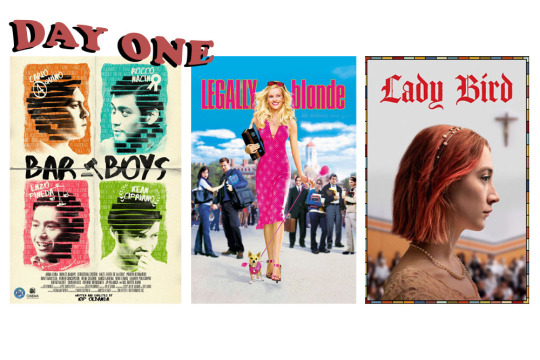
Bar Boys (2017, dir. Kip Oebanda) ★★★
The film that kickstarted everything, which I never would have seen if the director had not uploaded the full version on YouTube. This well-meaning tale of four best friends (Carlo Aquino, Rocco Nacino, Enzo Pineda, and Kean Cipriano) and the challenges they face in law school—terror professors, fraternities, and financial difficulties included—does have a lot of heart, and is sensitive enough to show how the effect of this experience differs depending on a student's background. But, what it lacked for me was a certain degree of specificity: I think the same premise would have been applicable in med school, or any other post-graduate degree for that matter. So, why did the characters choose law? I also would have appreciated some commentary on the shortcomings of the country’s justice system, and further fleshing out of the characters so the audience could have seen why we could count on them to fill in the gaps.
Legally Blonde (2001, dir. Robert Luketic) ★★★½
The rating might be surprising, considering that the courtroom scene was responsible for the short law school phase I had in Grade 5. As if I could ever make use of the rules of haircare in an actual cross-examination. Of course, I am compelled to admire Elle (Reese Witherspoon) and how her motivations for going to Harvard shift from winning back a boy to discovering what she never knew she had and using these gifts to help those around her (especially the manicurist, who I feel was given way more exposure than what was due to her). Ultimately, though it was inspirational at some points, it felt too good to be true and impossible to relate to. (But then again, shouldn’t there be a willing suspension of disbelief when consuming forms of media such as this?)
Lady Bird (2017, dir. Greta Gerwig) ★★★★★
I’ll probably end up making a separate post dedicated to this movie and how it singlehandedly called me out, as a sensitive, occasionally self-important product of an all-girls Catholic high school. For now, I am forced to condense my overflowing feelings into a couple of sentences. Lady Bird takes place over the course of the titular character's senior year, a pivotal moment in the lives of all teenagers. But, instead of focusing solely on the formulaic firsts like the normal coming-of-age film would, it shines a light on her dwindling relationship with her equally strong-willed mother. Saoirse Ronan’s colorful performance as the human embodiment of my pre-teen self's conscience, and Greta Gerwig’s tremendous ability to make even oddly specific scenes speak to any viewer shine through and speak to me the most, and easily make this gem something I will be recommending this to anyone who bothers to ask for as long as I live.
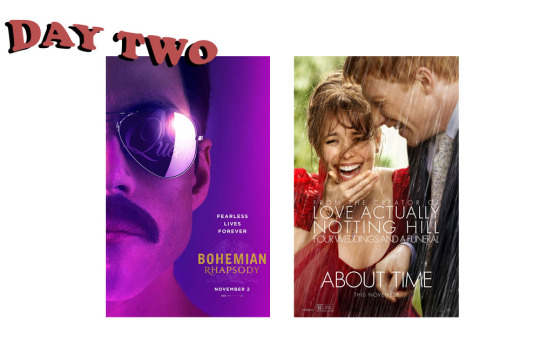
Bohemian Rhapsody (2018, dir. Bryan Singer) ★★★
There’s a lot of controversy surrounding Bo Rhap, particularly its failure to portray Freddie Mercury in a manner that does him justice. While I understand that it is a valid concern for fans of the band, I admit I don’t know enough about who he was as a person to criticize the film in this aspect. Regardless of its factuality, this still was just average for me, the typical rise-and-fall type of biopic that is indicative of a rockstar’s legacy, but with laughably faulty editing. The redeeming factors were Rami Malek’s brilliant portrayal of the legend himself—his Live Aid performance gave me chills that lasted the entire 20 minutes, how alarming—and, obviously, the soundtrack that I kept on loop for several days.
About Time (2013, dir. Richard Curtis) ★
Apparently, this movie focuses on Tim (Domhnall Gleeson), who discovers at age 21 that the men in his family have the power to time-travel and thus revise and repair certain parts of their lives. He uses this to address the fact that he’s never had a girlfriend, and effectively so as he ends up bagging Mary (Rachel McAdams), a charming American who is the settler in this relationship by default. But, of course, this gift is not without its dire consequences—or at least, that’s what it says on Wikipedia. It’s hard to trash on this and admit that I bailed halfway because so many of my friends swear by this. But, I just couldn’t stomach the lack of chemistry between the two leads; the surprisingly boring dialogue for a screenplay crafted by Richard Curtis of Notting Hill fame; and the story that, although bore enough of a resemblance to “The Time Traveler’s Wife” to be interesting, was still not powerful enough to sustain my attention.
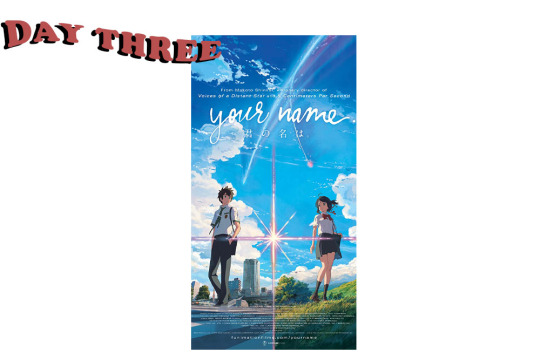
Your Name (2016, dir. Makoto Shinkai) ★★★★★
I’m a huge fan of plots that are sure to make my eyes swell and heart hurt—I can’t explain the psychology behind this either. So when this was recommended to me and I had made it through an hour without shedding a single tear, I was prepared to be disappointed. But, the events leading up to the conclusion proceeded to rip me into shreds, as if to taunt me and say, “You asked for it.” Mitsuha (Mone Kamishiraishi) and Taki (Ryunosuke Kamiki), teenagers living on opposite sides of the country, suddenly start switching bodies following the appearance of a comet. This unexplainable phenomenon causes them to forge an unbreakable bond that transcends the very limits of time and space. I know the description is not much, but it’s best to experience this unique plot for yourself. Besides its storyline, its charm lies in its excruciating attention to detail in depicting life in urban and rural Japan, both in the realistic animation of one picturesque scene after another, and the use of cultural elements to arrive at a twist viewers will not see coming.

Booksmart (2019, dir. Olivia Wilde) ★★★★½
I can't summarize what I imagine Booksmart to be for teenagers in the future, so here's an entire scenario: It's the year 2070. Two young girls of around 16 are sprawled on their bedroom floor, watching this on whatever device they use for streaming. (Maybe it's from an LCD projector embedded in their foreheads, who knows.) The credits roll, and they instantly think to themselves, "Man, we were born in the wrong generation!" (They simultaneously think of doing a high-five, and without raising their hands themselves, it happens because that's technology.) Anyway, Amy (Kaitlyn Dever) and Molly (Beanie Feldstein) are best friends who played by the rules all throughout high school and realized too late that they could’ve afforded to have a little more fun. On the eve of their graduation, they decide to cram four years’ worth of adventure in a single unpredictable and outrageous night, getting to grips with everything that comes their way in an exceedingly comedic yet refreshing fashion. Also, the protagonists have such a genuine and wholesome relationship: the way they hyped up their most ridiculous looking outfits, or overshared borderline uncomfortable stories is honestly my personal definition of an ideal friendship.
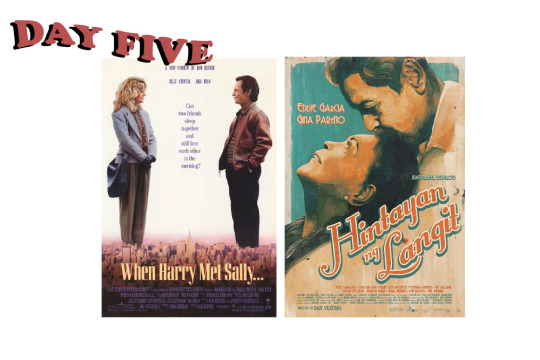
When Harry Met Sally (1989, dir. Rob Reiner) ★★★★½
Despite this film’s constant presence in every “chick flicks you must watch” list I’ve bothered searching up, I spent a huge chunk of my teen years in constant protest against the decision to cast Billy Crystal as the male lead instead of, I don’t know, literally any other actor on the planet. But, once I finished it, I realized that he’s a much better fit than I thought. The laidback Harry to Meg Ryan’s finicky Sally, both of them spare no effort exploring and debunking truths and misconceptions about modern relationships: examples of which are the idea of being high maintenance, and the quintessential question of whether a guy and girl can ever be just friends. Although their dynamic is the definition of slow burn, audiences can’t help but earnestly root for the pair—the frustration brought by the several almosts pay off in the end, as they lead to one of, if not, the most romantic love confession scene.
Hintayan ng Langit (2018, dir. Dan Villegas) ★★★★½
This tale adapted from a play by no less than Juan Miguel Severo is set in purgatory—a grandiose art museum-four star hotel hybrid of sorts—where souls can stop and rest while their papers for entry to heaven are being processed. It is here we meet Manolo (Eddie Garcia) and Lisang (Gina Pareno), ex-lovers with unfinished business. Things admittedly start off a bit slow, but it's understandable since there needs to be ample provision of context regarding the standard operating procedures of this unique waiting area. Once that’s done, the focus stays on the main actors, who drive audiences to tears with their powerful performances, and thought-provoking questions on matters of betrayal, forgiveness, and the afterlife. The ending had me rocking back and forth like a baby, my shirt soaked with tears, so do take heed and stock up on tissues!
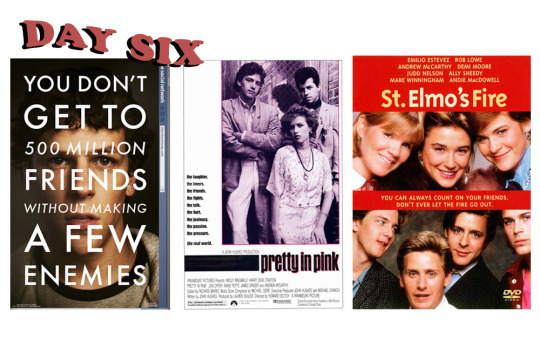
The Social Network (2010, dir. David Fincher) ★★★★★
Within its packed first 15 minutes alone, you can easily see what makes The Social Network an example of cinema at its finest: an intoxicated Mark Zuckerberg (Jesse Eisenberg) hacks into the websites of all Harvard dorms to create Facebook’s oldest ancestor from scratch, in an attempt to get back at his ex-girlfriend. The atmosphere is tense, the dialogue is loaded with witty one-liners and powerful insight, and the actors are so in touch with their characters they practically fuse into a single person. This remains consistent for the next two hours or so, making for an enjoyable and fast-paced, yet still informative glimpse into the human side of what is arguable the most powerful company of this era. I also heard that it’s much more fun if seen with the cast commentary on, so I’m gonna have to find a copy of that for myself!
Pretty in Pink (1986, dir. Howard Deutch) ★★★★★
I’m cheating here, I know: this has been a long-time favorite, but I guess I can still give a review if I was still 15 when I last saw this. Andie (Molly Ringwald) and Blane (Andrew McCarthy)’s classic “poor girl + rich boy = happily ever after” story is masterfully tackled by John Hughes, who manages to inject equal amounts of swoon-worthy romance and biting criticism of the inherent class divide in society. Others would argue that Duckie (Jon Cryer), Andie’s devoted best friend, is the true star of the show, and while I do agree that he has his shining moments (if you listen closely, you can hear Try A Little Tenderness playing softly in the background), I sadly inherited my mother’s adoration for Andrew, which I will pass on to my child and so on—truly the defining characteristic of our lineage.
St. Elmo’s Fire (1985, dir. Joel Schumacher) ½
I understand that being an adult in the Real World is bound to come with some grave mistakes and lapses in judgment. But, not a single character in this friend group redeems themselves by the end. While Ally Sheedy’s Leslie and Mare Winningham’s Wendy were just borderline forgettable (why did the latter even end up here with the Brat Pack?), Judd Nelson’s Alec cheats on his girlfriend and believes that marriage is what will make him change his ways; Rob Lowe’s Billy neglects the family he didn’t plan on having by fooling around with other women and making a home out of his favorite bar; Demi Moore’s Jules relies on cocaine and extramarital affairs to hide trauma she refuses to process, and Andrew McCarthy’s pretentiously cynical Kevin suddenly claims he knows what love is when Leslie pays attention to him for 10 minutes. But, none of them compare to Emilio Estevez’ Kirby, the sociopath obsessed with a girl he barely knows. It honestly resembles some sick contest of how many problems this gang can cause before they end up behind bars, with the last scene being a lazy and rushed attempt to wrap everything up, in the name of this surface-level “friendship”.
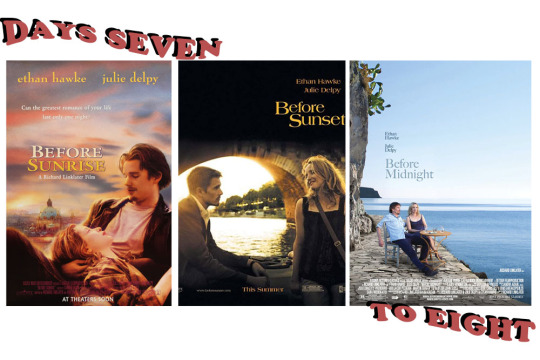
Before Sunrise, Sunset, and Midnight (1995, 2004, 2013; dir. Richard Linklater) ★★★★★
Guess it’s better to admit it now, but I made this post as an excuse to rave about how beautiful this trilogy is, the most authentic depiction of love in its purest form. Sunrise has been recommended to me by both friends and the Netflix algorithm, but I put off watching it again and again and again. I mean, what could I possibly get out of looking at two strangers roam around Vienna? Well, to answer that question: quite a lot. Jesse (Ethan Hawke) and Celine (Julie Delpy)’s relationship spans an entire trilogy, and throughout that period, they manage to define then destroy the idea of having a soulmate to call your own in approximately six hours. But certain constancies are present in each movie: the emotion intense even in the smallest of gestures (you don't understand the anguish I feel when the scene at the listening booth randomly pops in my head), the dialogue truly thought-provoking and natural, the settings so picturesque, and the chemistry of the actors so electric I have trouble believing that the director didn’t actually invade the personal space of a real couple and eventually get issued a restraining order.
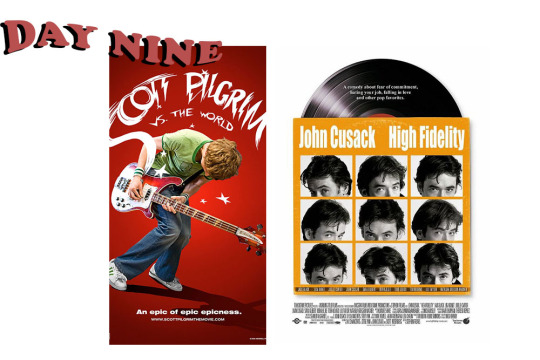
High Fidelity (2000, dir. Stephen Frears) ★★
I’d like to think of this as an essay: I'm confident that the introduction is the protagonist Rob's soliloquy on his five biggest breakups to understand why he’s so flawed that everyone always leaves him, and the conclusion his attempt to win his ex Laura (Iben Hjejle) back. But as for the body, I’m not entirely sure. Interspersed between these moments are thoughtful top five lists of anything that can be enumerated, and occasional banter with the employees at his record store that may be charming, but do not enhance the film in any way, shape, or form for me. Also, I normally enjoy seeing John Cusack onscreen, but more often than not, he was nagging in front of the camera instead of talking to the people around him; no wonder his relationships failed!
Scott Pilgrim vs the World (2010, dir. Edgar Wright) ★★★
I wanted to enjoy this so bad, I swear! Sadly, the one thing I gained after seeing this is knowledge of where the “I’m So Sad, So Very Very Sad” meme came from. I get that it’s supposed to resemble a comic book or video game, and maybe the reason why I failed to appreciate this as much is because I was never a fan of either. I found the prolonged action scenes surprisingly boring, the storyline too fantastic, and the whole quest of having to defeat seven monstrous exes for the hand of a manic pixie dream girl not worth it in the end. Although I can’t give it less than three stars given its impressive visual effects, and appeal to the entire Tumblr community (gamers on one end, millennial film connoisseurs on the other), it’s definitely not something I would watch a second time.
There will surely be more where that came from! (I mean it. Since completing this post, I’ve finished another five films.) If you wanna keep tabs on what I’m watching without having to wait on another post, you can give my Letterboxd a follow. Wishing you love and light always, and don’t forget to wash your hands and pray for our frontliners!
#recs#angeltriestoblog#life dump#movies#movies to watch during quarantine#or at least movies I'VE watched over quarantine#so far#17 films are u CRAZY!!!!#i have carpal tunnel#quarantingz
0 notes
Text
Your Name ( Kimi No Nawa ) is one of these anime which you MUST SEE
A shoo in for greatest-grossing anime film of 2016 and a with a of Business Ghibli’s best box office outcomes, Your Title (Kimi no Na wa) by up-and-arriving Japanese cartoon manager Makoto Shinkai is one crazy trip of the movie. The peculiar sci fi dream, whose tale is participating enough if lastly incomprehensible, must spark an web battle of understandings in the teenager viewers who're its primary goal. In short, it informs the tale of the Tokyo child along with a schoolgirl in the stays who start having unexpected out-of-body encounters — in each other’s physique, to become exact — just like a comet is moving over China. Their efforts to consider each other’s title once they go back to their very own systems and also to actually get together becomes a bittersweet, difficult love laced with laughter and magical innuendo.
Meanwhile, the pending green-catastrophe that stimulates the final area of the movie revives the residual stress of Japan’s 2011 tsunami and quake. Shinkai, who also published and edited the picture, loads a great deal about the bowl of starving cartoon enthusiasts.
First rate Japanese anime is just a flavor that anybody may obtain within the period it requires to look at a film-like this, also it must verify Shinkai’s status to style-enthusiasts all over the world, who understand his composition-impressed The Backyard of Phrases. Launched in China in late July, Your Title has made near to $150 million locally and gained the most effective cartoon honor at Sitges, in addition to being highlighted in the San Sebastian, Busan, Tokyo and London festivals. It's been acquired by FUNimation within the U.S.
However for all its enjoyable uniqueness, it's nevertheless several actions behind the miracle, penetrating observations and serious humanity of Japan anime pantheon guide by Hayao Miyazaki and Mamoru Hosoda. The mission of the film’s odd-couple, Taki and Mitsuha, merely doesn’t mix one's heart. Possibly it’s their freedom from the household backstory which makes them appear so subjective. And that’s not checking the story, making little feeling.
The wonder of the function is based on its capability to mix the creativity with spooky, resonant palm-driven cartoon, such as the starting series of streaking missiles penetrating the clouds and slipping through the atmosphere like fireworks. These come out to become pieces of the comet that's moving really near to the Planet, within the Western country wherever Mitsuha (voiced by Mone Kamishiraishi) lifestyles together with her grandma in a wonderful small-town constructed around a river. Mitsuha isn’t awfully thinking about the neighborhood customs and traditions that pervade the area, and desires of shifting to Tokyo with all a large town could possibly offer.
Taki’s existence (Ryunosuke Kamiki) unfolds in Tokyo together with his college friends and his after school work like a waitress. Oneday, from the orange, he gets up each morning to locate herself in Mitsuha’s body. Their surprise at having chests, which he can’t quit pressing, provides a grin, like his puzzled try to participate in her college life.
In the same period, Mitsuha gets up in Taki’s male physique and dislikes likely to the toilet. She discovers himself rushing to maintain with the visits and responsibilities outlined on his cellphone. Her female aspect shines to great impact on an enhanced older woman Taki includes a break on. Wherever Taki is uncomfortable and tongue tied around her, his stand in Mitsuha is comfortable and calm, earning him a romantic date.
Them both envision they're thinking and certainly will quickly awaken, that they do many times within the span of the movie. They trade systems repeatedly again, till they ultimately capture onto the unusual, mysterious change that's occurring.
Provided that Mitsuha’s globe is traditional and classic, the viewer’s first speculation may be that this can be a reincarnation tale, but it’s much more complex than that. Specially when as it happens that Mitsuha is residing 3 years previously when compared with Taki, before a catastrophe ruined her city and several of its occupants. At this time all bets are off, and also the tale shifts into immediate brave style as Taki and Mitsuha function across period and room to avoid the calamity. As sci fi visitors understand, it’s difficult to alter yesteryear with potential understanding, however they provide it their finest chance prior to the movie begins to obtain dropped in multiple endings.
In the same period, both young adults are slipping in deep love with each other, but can’t develop a method to fulfill, because once they awaken within their own houses and systems they've no obvious storage of the other. The pic’s stunning closing picture in Tokyo poignantly performs with this cosmic paradox while offering some sensitive closing.
Joining with Shinkai is cartoon director Masashi Ando, who done several Business Ghibli classics. Shinkai’s accustomed super-practical skills of structures and cityscapes might nearly move for photography, were they not necessarily getting around in unusual methods. Providing the tale a modern, sometimes annoyingly traditional defeat may be the audio of Yojiro Noda and his common J Rock bank Radwimps.
Where i can watch Your Name?
Mostly i watch every animated movie on Full Of Anime streams website which is pretty good and i can recommend it in 100%, you can also look at google to find it :)
0 notes